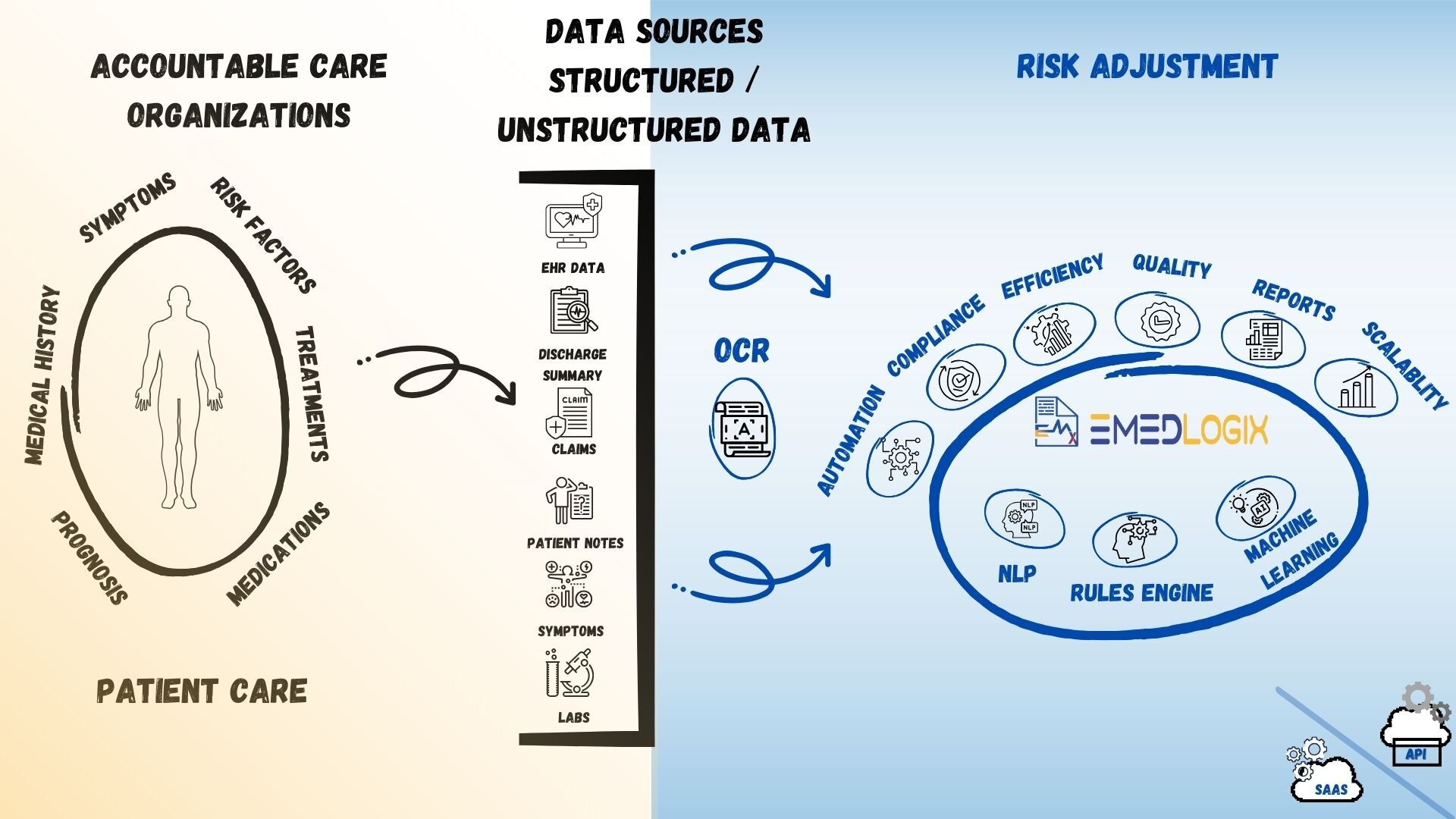Accountable Care Organizations
Efficient healthcare decision-making
Accountable Care Organizations (ACOs) – Accurate HCC Coding & Risk Adjustment with Emedlogix
Accountable Care Organizations (ACOs) and Hierarchical Condition Category (HCC) coding are closely linked in the context of value-based care. ACOs are groups of healthcare providers that come together to deliver coordinated high-quality care to Medicare patients, aiming to improve patient outcomes while controlling costs. HCC coding plays a crucial role in this model by helping to accurately assess the health status of the population served by an ACO.
Key Connections Between ACOs and HCC Coding:
- HCC coding allows ACOs to determine the risk levels of their patient populations. By assigning risk scores based on patients’ diagnoses, ACOs can anticipate healthcare costs and allocate resources more effectively. Higher risk scores typically reflect a sicker patient population, which can justify higher reimbursement rates.
Financial Incentives:
- Accurate HCC coding is vital for ACOs to secure appropriate funding. As part of the Shared Savings Program, ACOs are rewarded for achieving cost savings while maintaining or improving quality.
- Accurate risk adjustment through HCC coding ensures that ACOs are fairly compensated based on the complexity of the patient population they serve.
Quality of Care:
- HCC coding helps ACOs identify high-risk patients who may need more intensive management or specialized care. This focus enables ACOs to implement targeted interventions, improve patient outcomes, and enhance overall care quality.
Data-Driven Decision Making:
- By leveraging HCC data, ACOs can analyze trends and patterns in their patient population, informing strategic decisions around care management and resource allocation. This data-driven approach enhances care coordination and helps in identifying areas for improvement.
Compliance and Reporting:
- ACOs must adhere to regulatory requirements, making accurate HCC coding essential for compliance. Proper documentation and coding are crucial for avoiding penalties and ensuring that all eligible conditions are captured for risk adjustment.
In summary, HCC coding is integral to the functionality and success of ACOs, enabling them to effectively manage risk, optimize financial performance, and enhance patient care through coordinated efforts.

Emedlogix Workflow

FAQs related to Accountable Care Organization
An Accountable Care Organization (ACO) is a network of healthcare providers that collectively take responsibility for the quality and cost of care for a defined population—primarily Medicare patients. ACOs aim to improve health outcomes through care coordination and value-based strategies.
ACOs function by promoting collaboration between doctors, hospitals, and specialists. They share patient data, align incentives, and use tools like HCC coding to manage chronic conditions, reduce hospital readmissions, and optimize resource allocation.
Outsourcing chart review and audit tasks to Emedlogix is beneficial when an ACO needs to improve coding accuracy, ensure compliance, and optimize risk adjustment without overburdening internal resources. Emedlogix’s advanced tools streamline the process, reducing errors and saving time while maximizing reimbursement.
Emedlogix ensures the secure handling of patient data during interactions with ACOs' cloud or datacenter systems through robust measures, including:
•End-to-End Encryption: Advanced encryption secures data during transmission.
•Access Controls: Role-based access and strict authentication protect sensitive information.
•Secure APIs: Industry-standard APIs minimize integration vulnerabilities.
•Regulatory Compliance: Processes align with HIPAA, ISO 27001, and other standards.
•Monitoring and Auditing: Continuous oversight detects and mitigates security risks.
Our AI-enabled platform ensures accurate and compliant HCC coding by extracting key insights from unstructured clinical data, streamlining the risk adjustment process, and supporting ACOs in meeting Medicare Advantage and other regulatory requirements.
Configuring both Medicare HCC Models V24 and V28 allows ACOs to optimize their risk adjustment strategies by addressing specific patient populations and care needs. Emedlogix’s solution helps enhance coding accuracy, improve RAF scores, and ensure compliance with both Medicare models for better reimbursement and care management.
Emedlogix can configure Medicare HCC Models V24 and V28 for a new Accountable Care Organization (ACO) typically within a few weeks. The platform’s flexible architecture allows for rapid setup and testing of new configurations, with pre-built engines and customizable workflows that streamline the process, ensuring efficient implementation for both current and retroactive claims. The configuration time may vary depending on data complexity, but Emedlogix ensures minimal delay for ACOs adopting new models.
Emedlogix leverages AI-powered NLP, OCR, and machine learning to extract structured data from clinical documentation and accurately map diagnosis codes to HCCs, ensuring compliant and efficient risk adjustment.
Emedlogix complies with HIPAA and industry best practices for data security, using encrypted communications and secure cloud environments to protect all patient interactions.
